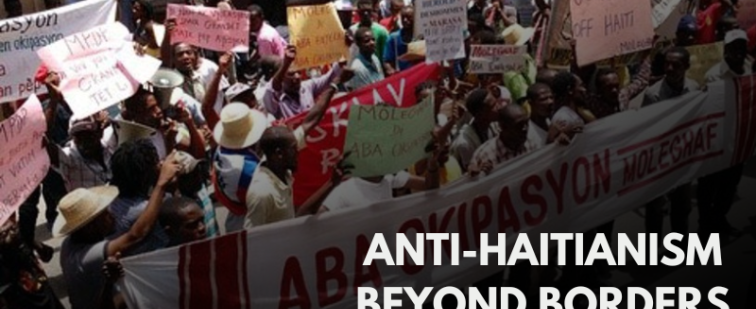Home
The assumption that few Latinos would participate in the U.S. midterm elections underestimated their political sophistication, as they were simultaneously disappointed with the Democrats, but also inclined to vote for them as a defensive measure against the virulently anti-immigrant Republicans. Despite economic woes, and no progress on immigration reform, Latino voters came out in much greater numbers than predicted. It is this grassroots and sophisticated organizing power that this newest edition of NACLA Report on the Americas examines.
Drug-trafficking has been on the rise in Central America since 2008, justifying the expansion of the U.S.-led drug war into the region. In a place where Washington has historically wielded tremendous power, the United States plans to continue using the same failed drug war strategy as it has in Colombia and Mexico. 7,000 U.S. Marines have already been approved for Costa Rica, and other countries, such as Honduras, are asking for an increased U.S. military presence. There is a broader geopolitical strategy, critics say, for the United States to tighten its hegemonic grip in the region.
On September 20, Haitian prime minister Jean-Marc Bellerive, U.S. Secretary of State Hillary Clinton, and the World Bank announced their partnership with a South Korean garment firm to establish an industrial park that will create 10,000 garment assembly jobs in Haiti. Without a doubt, earthquake-ravaged Haiti needs jobs, mainly to provide the country’s 1.3 million homeless with the means necessary to rebuild their destroyed homes. However, rather than solve the housing problem, the factories will depend on the vast pool of low-wage labor present in the homeless camps. Haiti's meager minimum wage of $3.09 per day will be barely enough to cover the worker's food expenses.
Congressman Sam Farr (D-CA), joined by 29 other Members of Congress, sent a letter to Secretary of State Hillary Clinton today calling on the Obama Administration to suspend aid - particularly military and police assistance - to the government of Honduras, while murders of political activists and media workers and other attacks in that country continue with near impunity.
On September 13, the Cuban government made a stunning announcement: Within the next six months, state payrolls will shed half a million workers. Additionally, the government will allow a great expansion of self-employment which it hopes will offset the planned layoffs. The new measures mark a sea change in Cuba, and some observers have speculated that this will mean the end of socialism itself. But the more compelling question is how will the Cuban leadership, who insist they will not embrace capitalism, now define socialism?
On September 30, about 1,000 Ecuadoran national police officers staged a rebellion, accusing Ecuadoran president Rafael Correa of vetoing benefits enjoyed by the country's public servants. However, as well-coordinated protests spread over four of Ecuador's provinces, and with the police shooting to kill, the Correa administration accused the country's right-wing opposition of planning a coup. Labor and indigenous organizations in Ecuador, however, have taken a more nuanced line. The police rebellion occurred, they argue, because Ecuador’s right wing is taking advantage of weaknesses created by Correa’s alienating governing style.
On October 3, Worker’s Party (PT) candidate Dilma Rousseff won the first round of Brazil’s presidential election with 46.9% of the vote. Paramount to Rousseff’s victory was her ability to convince voters that she represented the continuity of the policies of popular Brazilian president Luiz Inácio Lula da Silva. It was initially thought that for many of Brazil’s social movements Rousseff's message of “business as usual” would be received unfavorably, given the lack of structural change during Lula’s two administrations. Yet, this has not been the case, and many of Brazil's social movements see in Rouseff the potential to usher in further social change, including land reform and a shorter work week.
A set of policies adopted in January 2010 during the de facto presidency of Roberto Micheletti are now the basis of the goals for USAID's latest round of "democracy promotion" funding in Honduras. This will continue the long history of U.S. funding of the Honduran elite, the very players allegedly behind the June 2009 military coup that ousted former president Manuel Zelaya. What is cloaked as funding for democracy is likely to help these elites further consolidate their power, and serve as an impetus to push through neoliberal economic reforms that were stalled under Zelaya.
Students are delivering an open letter to Georgetown University president John J. DeGioia today, signed by over 150 scholars, urging the university to reconsider its appointment of former Colombian president Álvaro Uribe as a visiting scholar. The letter objects to Uribe’s ties to paramilitary groups, the scandal in which members of the Colombian military killed civilians but claimed they were guerrillas, corruption and human rights violations in his administration, manipulation of the judiciary, and a notorious wiretapping scandal.
If not for the testimony of 18-year-old Ecuadorian migrant Freddy Lala, the August 26 massacre of 72 migrants in Tamaulipas may have remained out of the eye of the mainstream media and chalked up as another example of the violent turf war fought by Mexico's organized crime syndicates. However, the events point to another serious and common issue in Mexico, the chronic human rights violations of migrant workers as they pass through the country in transit to the United States. Every year, according to Mexico's National Human Rights Commission (CNDH), around 20,000 migrants are kidnapped or abused by gangs, cartels, and government authorities before they reach the United States. This dramatic increase in abuses, however, was predicted in 2001 when Mexico began to take a hard-line stance against immigration on its southern border.












